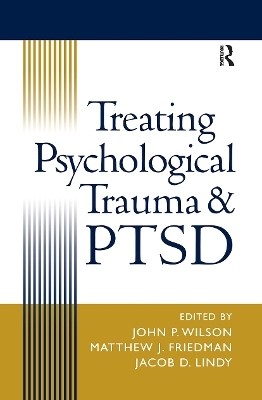
Treating Psychological Trauma and PTSD
Guilford Publications (Verlag)
978-1-57230-687-5 (ISBN)
- Titel z.Zt. nicht lieferbar
- Versandkostenfrei
- Auch auf Rechnung
- Artikel merken
Much has been learned about PTSD in the past two decades, yet many questions remain about the complex pathways by which trauma disrupts people's lives. This authoritative volume presents an innovative psychobiological framework to help clinicians and researchers better understand the myriad difficulties facing patients and navigate the array of available intervention approaches. Incorporating the latest theory and clinical research, the book provides a crucial reformulation of diagnostic criteria and treatment goals. It then brings together leading treatment experts to describe and illustrate their respective approaches, facilitating the selection and implementation of the most effective interventions for individual patients.
The book first delineates a holistic, organismic model of PTSD. Particular attention is given to how the concept of allostatic load has enabled contemporary investigators to gain a more dynamic view of human stress responses and how they may go awry. Aided by clearly presented tables and charts, the volume elucidates the process by which traumatic experiences can give rise to 65 symptoms contained within five symptom clusters. Augmenting the traditional domains of PTSD symptomatology/m-/physiological disturbances, traumatic memory, and avoidance/m-/are two additional clusters dealing with frequently encountered problems with self and identity and with attachment, intimacy, and personal relationships. Contributors then provide detailed presentations of core therapeutic approaches: acute posttraumatic interventions, cognitive-behavioral approaches, pharmacotherapy, group psychotherapy, and psychodynamic techniques, as well as approaches for special populations. The concluding section reviews and synthesizes all case material presented, examining which symptoms are addressed by each modality, which treatment objectives are met, and which clients are likely to be helped.
John P. Wilson, PhD, is Professor of Psychology at Cleveland State University. An internationally recognized expert on PTSD, he is the past president of the International Society for Traumatic Stress Studies. He is the coeditor of [ital]Assessing Psychological Trauma and PTSD[/ital] (with Terence M. Keane) and [ital]Countertransference in the Treatment of PTSD[/ital] (with Jacob D. Lindy). Matthew J. Friedman, MD, PhD, before retiring in 2022, was founder and Director of the National PTSD Brain Bank; Senior Advisor to the National Center for PTSD, where he served for 24 years as Executive Director; and Professor and Vice Chair for Research in the Department of Psychiatry at the Geisel School of Medicine at Dartmouth. He worked as a clinician and researcher for over 50 years, and has approximately 360 publications, including 29 books. Jacob D. Lindy, MD, is a training and supervising analyst at the Cincinnati Psychoanalytic Institute. For 27 years he has adapted psychoanalytic clinical theory to the special circumstances of the trauma survivor. He is the past president of the International Society for Traumatic Stress Studies and has just completed 5 years as Director of the Cincinnati Psychoanalytic Institute. His publications include [ital]Countertransference in the Treatment of PTSD[/ital] (coedited with John P. Wilson).
Contents
I. Theory, Models, and Clinical Paradigms of Treatment
1. Treatment Goals for PTSD, John D. Wilson, Matthew J. Friedman, and Jacob D. Lindy
2. A Holistic, Organismic Approach to Healing Trauma and PTSD, John P. Wilson, Matthew J. Friedman, and Jacob D. Lindy
II. Clinical Treatment of PTSD
3. An Overview of Clinical Considerations and Principles in the Treatment of PTSD, John P. Wilson
4. Allostatic versus Empirical Perspectives on Pharmacotherapy for PTSD, Matthew J. Friedman
5. An Allostatic Approach to the Psychodynamic Understanding of PTSD, Jacob D. Lindy and John P. Wilson
6. Acute Posttraumatic Interventions, Beverley Raphael and Matthew Dobson
7. Cognitive-Behavioral Approaches to PTSD, Lori A. Zoellner, Lee A. Fitzgibbons, and Edna B. Foa
8. Group Psychotherapy for PTSD, David W. Foy, Paula P. Schnurr, Daniel S. Weiss, Melissa S. Wattenberg, Shirley M. Glynn, Charles R. Marmar, and Fred D. Gusman
III. Clinical Treatment Approaches for Special Trauma Populations
9. Treatment of Persons with Complex PTSD and Other Trauma-Related Disruptions of the Self, Laurie Anne Pearlman
10. Dual Diagnosis and Treatment of PTSD, Alexander C. McFarlane
11. Cross-Cultural Treatment of PTSD, J. David Kinzie
12. Treatment Methods for Childhood Trauma, Kathleen Nader
13. Treatment of PTSD in Families and Couples, Laurie Harkness and Noka Zador
14. Treatment of PTSD in Persons with Severe Mental Illness, Kim T. Mueser and Stanley D. Rosenberg
IV. Case History Analysis and Practical Considerations
15. Case History Analysis of the Treatments for PTSD, Jacob D. Lindy, John P. Wilson, and Matthew J. Friedman
16. Practical Considerations in the Treatment of PTSD: Guidelines for Practitioners, John P. Wilson, Matthew J. Friedman, and Jacob D. Lindy
17. Respecting the Trauma Membrane: Above All, Do No Harm, Jacob D. Lindy and John P. Wilson
| Erscheint lt. Verlag | 29.11.2001 |
|---|---|
| Verlagsort | New York |
| Sprache | englisch |
| Maße | 152 x 229 mm |
| Themenwelt | Geisteswissenschaften ► Psychologie |
| Medizin / Pharmazie ► Medizinische Fachgebiete ► Notfallmedizin | |
| Medizin / Pharmazie ► Medizinische Fachgebiete ► Psychiatrie / Psychotherapie | |
| Studium ► 2. Studienabschnitt (Klinik) ► Anamnese / Körperliche Untersuchung | |
| ISBN-10 | 1-57230-687-4 / 1572306874 |
| ISBN-13 | 978-1-57230-687-5 / 9781572306875 |
| Zustand | Neuware |
| Haben Sie eine Frage zum Produkt? |
aus dem Bereich


